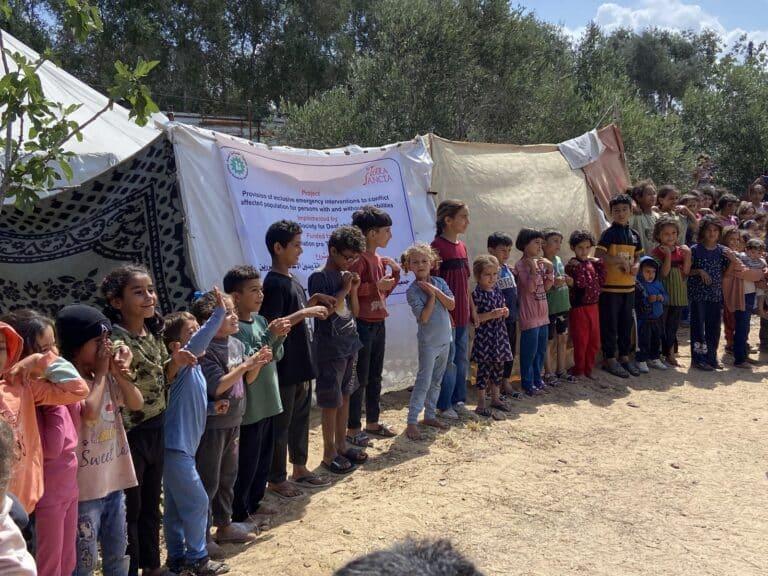It is the voice of Rahab, ten years old, carrying a profound pain that she learns every day in the refugee camp of Deir al-Balah. The war in Gaza has not stopped.
Rahab lost her mother and sister in this war: all she has left is a suffering that she has managed to transform into poetry, joining her voice to a song that has echoed for centuries.
“I cry in pain, and my tears flow on my cheek,
Where is the one who wipes the tears from my cheek?
Who will answer the cries of a child grieving?
Oh, mother, how painful are the tears on my cheek,
And who can bear the burden of these tears?”
Who can answer? Her voice falls into the deafening silence of war: there is no longer a mother to listen, and the world always seems on the verge of looking away, indifferent.
“I want, oh Lord, to live in peace,
and to play, run, and see joy.
This is my dream, and this is my hope…”
Peace, play, and joy are a dream, a hope: they are distant and fade into the black smoke of bombs, heart-wrenching in their unreachable normality.

“The current situation in the Gaza Strip is extremely fragile. Last year, like everyone here, I was forced to relocate to what is called a safe zone in the south of the Strip,” says Fida Sharaf. Fida is the head of external relations at Atfaluna, a Palestinian NGO based in Gaza City that supports people with hearing disabilities in the Strip. Today, with the support of Pro Terra Sancta, it also provides material and psychological support to children like Rahab.
“Like many others, I have been displaced several times,” Fida continues, “and for people with disabilities, there are significant additional challenges: most services have been reduced, increasing their vulnerability and the risks they face compared to others. In particular, since last year, it has become almost impossible to bring hearing aids, spare parts, batteries, and all the materials needed for screenings and audiological interventions into the Strip.”
The primary mission of Atfaluna is to protect the rights of people with disabilities, the first to be forgotten in humanitarian emergencies. As we have already discussed regarding children with butterfly disease, people with disabilities often require care and equipment that, under the bombs, are no longer considered a priority. “Imagine a person with physical disabilities,” Fida continues: “They cannot evacuate, cannot access the aid they need, nor participate in psychosocial activities. It is crucial that assistive devices are made available as soon as possible,” so that resources – however limited – can reach everyone, leaving no one behind.
Over time, particularly after the escalation of conflict following the attacks of October 7, 2023, Atfaluna has expanded its range of interventions, establishing a humanitarian action program dedicated to people with and without disabilities throughout the Gaza Strip. Today, however, the needs are evolving: “It has been over a year since the conflict began: we can no longer limit ourselves to humanitarian aid alone; we must also work programmatically,” Fida explains. “We need to focus on psychosocial support and educational and recreational activities. We do this through protection interventions for adults and children, with and without disabilities.”
The name of the project led by Atfaluna and Pro Terra Sancta reflects the aim of these interventions: Providing Inclusive Emergency Support Services for People with and without Disabilities Affected by the Conflict in the Gaza Strip. Emergency support services include psychological support as a cornerstone: this is essential to help victims of the emergency understand their pain, process it, and learn to live with it.
Thanks to psychosocial support sessions, young Rahab discovered poetry as a powerful tool for expression and healing. Referring to the team members who guided her through this journey, Rahab says, “They managed to lift my spirits and change my environment. They helped me find a way to cope with my pain and start to heal.”
“You reminded me of who I am,” says Suad, also ten years old and another victim of pain too immense to put into words. She had to leave Gaza to seek refuge with her mother in Deir al-Balah due to the bombings, under which she lost her home—and her father.
“You reminded me that I am a very strong person and that everyone loves me.” Suad has rediscovered herself, her strong and vibrant character as a child, thanks to a supportive environment that taught her to listen to and understand her emotions and traumas.
“We want to send a message of hope, a message for everyone.” Fida is proud and resolute in her mission to highlight the needs and rights of Gaza Strip residents, including those with disabilities. “Among our projects are training programs, such as the community kitchen, which involve people with disabilities by teaching them a trade and enabling them to apply it in support of their community. The community kitchen prepares hot meals every day for displaced families: in this way, people with disabilities become active participants in humanitarian activities,” Fida explains with pride.
“We want to encourage all humanitarian actors to support the right of people with disabilities to be part of emergency responses, despite all the challenges.”
It is a noble mission that Pro Terra Sancta supports by partnering with local associations and NGOs like Atfaluna. Because, as Fida passionately asserts, “The people of the Gaza Strip deserve hope, deserve to live with dignity, deserve a chance for peace.”






